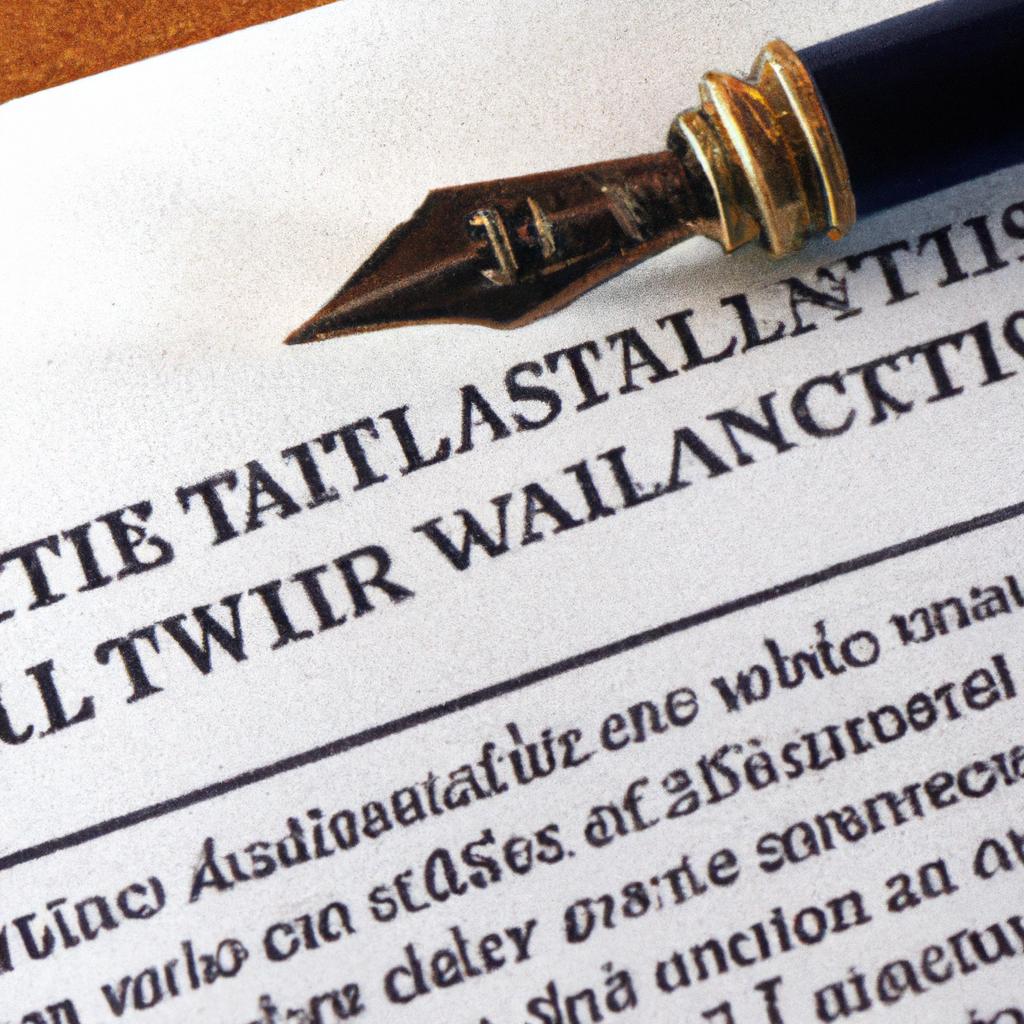In the intricate realm of estate planning and probate law, the question of who safeguards the original copy of a will often arises as a pivotal concern. As seasoned professionals at Morgan Legal Group, headquartered in the vibrant hub of New York City, we have encountered an array of queries surrounding the preservation of this crucial document. In this article, we delve into the intricacies of will custody to shed light on the responsibilities and implications associated with safeguarding the original copy.
Understanding the Role of the Testator in Will Storage
When it comes to the storage of a will, one of the key questions that often arises is who keeps the original copy of the document. The person responsible for safeguarding the original will, known as the testator, plays a crucial role in ensuring that their final wishes are appropriately executed. It is essential for the testator to understand their responsibilities and options when it comes to storing their will.
As the creator of the will, the testator can choose to keep the original document in a secure location themselves or entrust it to a trusted individual or institution. Some common options for will storage include safety deposit boxes, a lawyer’s office, or a designated executor or personal representative. It is important for the testator to inform the chosen party of the location of the will and ensure that it is easily accessible when needed. Additionally, the testator may also consider creating copies of the will to be kept with various individuals to prevent any loss or misplacement of the original document.

The Importance of Safeguarding the Original Will Document
Preserving the original will document is paramount in the estate planning process. It serves as the ultimate proof of the deceased individual’s final wishes and intentions. Without the original will, there can be disputes, challenges, and complications during the probate process.
- Only the person who created the will can keep the original copy
- It should be stored in a safe and secure location
- It is advisable to inform a trusted individual, such as an attorney or family member, about the whereabouts of the original will
Failure to safeguard the original will can lead to significant legal issues and potentially invalidate the document altogether. It is essential to take the necessary precautions to ensure that the original will is protected and easily accessible when needed. At Morgan Legal Group, we emphasize the importance of securely storing the original will to avoid any confusion or disputes in the future.
| Name | |
|---|---|
| John Doe | johndoe@example.com |
| Jane Smith | janesmith@example.com |

Exploring Options for Securely Storing a Will with Legal Professionals
When it comes to securely storing a last will and testament, many individuals wonder who should keep the original copy of the document. In most cases, there are several options available, each with its own advantages and considerations. Here are some of the main options for securely storing a will with legal professionals:
Option 1: Store with your attorney:
- Pros: Your attorney will have access to the document when needed for the probate process.
- Cons: There may be additional fees for storage, and if your attorney retires or moves, finding the will could become challenging.
Option 2: Store in a safe deposit box:
- Pros: Safe deposit boxes offer high levels of security and protection from theft or damage.
- Cons: Access to the box may be limited, and if the box is forgotten, locating the will could become difficult.

Considerations for Designating a Trusted Executor or Attorney to Hold the Original Will
When designating a trusted executor or attorney to hold the original will, there are a few important considerations to keep in mind. Firstly, it is crucial to choose someone who is reliable, responsible, and detail-oriented. This individual will be tasked with safeguarding the document until it is needed, so ensuring they are trustworthy is paramount.
Additionally, the designated executor or attorney should be someone who is capable of handling legal matters and has a good understanding of estate planning laws. They should also be someone who is organized and able to keep important documents in a secure location. By choosing the right person to hold the original will, you can have peace of mind knowing that your final wishes will be carried out according to your instructions. Trust is key when designating an executor or attorney to hold the original will.
| Name | Experience | Qualifications |
|---|---|---|
| John Smith | 10 years | Probate attorney |
| Sarah Johnson | 5 years | Estate planner |
| Michael Brown | 15 years | Elder law specialist |
Q&A
Q: Who keeps the original copy of a will?
A: The original copy of a will is typically kept by the person who made the will, known as the testator.
Q: Can someone else hold onto the original copy of a will?
A: Yes, the testator can choose to have a trusted individual, such as a lawyer or family member, hold onto the original copy of the will for safekeeping.
Q: What happens if the original copy of a will is lost or damaged?
A: If the original copy of a will is lost or damaged, it can create complications during the probate process. It is important to notify the appropriate parties and consider creating a new will to avoid any confusion.
Q: Is it necessary to keep the original copy of a will in a safe deposit box?
A: While keeping the original copy of a will in a safe deposit box can provide added security, it may also create difficulty for loved ones to access the will after the testator’s death. It is important to weigh the pros and cons before choosing this option.
Q: What should someone do if they are unsure about the location of a loved one’s original copy of a will?
A: If someone is unsure about the location of a loved one’s original copy of a will, they should start by searching the testator’s home and personal belongings. If the original copy cannot be found, they may need to consult with a probate attorney for guidance on how to proceed.
Future Outlook
In conclusion, determining who keeps the original copy of a will can vary depending on individual circumstances and laws in place. It is crucial to carefully store and communicate the location of your will to ensure that your wishes are properly carried out. Consulting with a legal expert can provide guidance on the best practices for safeguarding your will and ensuring its authenticity in the event of your passing. As the ultimate document of your final wishes, the original copy of your will should be treated with care and attention to detail. Thank you for exploring this important aspect of estate planning with us.
 Meta title: Who Keeps the Original Copy of a Will? All You Need to Know
Meta title: Who Keeps the Original Copy of a Will? All You Need to Know
Meta description: Are you wondering who is responsible for keeping the original copy of a will? This article delves into the importance of the will, who keeps the original copy, and practical tips for maintaining its validity. Read on to learn more!
A will is a legally binding document that outlines how a person’s assets and possessions should be distributed after their death. It also names an executor who will be responsible for carrying out these instructions. With the importance of a will in mind, it’s natural to wonder who keeps the original copy. In this article, we’ll explore the answer to this question and provide valuable information on wills and their proper upkeep.
The Importance of a Will
Before we delve into who holds the original copy of a will, it’s important to understand why wills are essential. A will allows you to have control over your assets and who receives them after your death. It also allows you to appoint a guardian for any minor children you may have. Without a will, the distribution of your assets and the guardianship of your children will be decided by the court.
Moreover, a will can help avoid any potential disputes over your assets by clearly outlining your wishes. It also provides peace of mind, knowing that your loved ones are taken care of according to your wishes. Therefore, it’s crucial to keep your will updated and in a safe place to ensure its validity.
Where Should You Keep Your Will?
Once you’ve created a will, the next step is to determine where to keep it. You have a few options when it comes to storing your will.
1. With Your Attorney
Many people choose to keep their will with their attorney, especially if their attorney helped create it. This ensures that a legal professional has access to the will, and in case of any changes, they can assist and update it.
2. In a Safe Deposit Box
Another common option is to keep your will in a safe deposit box at a bank. This provides added security, and you can rest assured that your will is safe from any damage or loss. However, it’s essential to keep in mind that the executor will need to have access to the safe deposit box after your death, so it’s crucial to provide them with a key or add their name to the rental agreement.
3. In a Home Safe
If you have a home safe, you can choose to keep your will there. This allows easy access for updates and ensures that it’s safe from any potential hazards like fires or floods. Just like with a safe deposit box, it’s crucial to ensure the executor has access to the home safe after your passing.
4. With the County Surrogate
Some states allow you to file a will with the county surrogate’s office. This ensures that the will is a matter of public record, and all parties involved can easily access it if needed.
Who Keeps the Original Copy of a Will?
Now that you understand where you can keep your will, it’s equally important to know who is responsible for keeping the original copy. Once a will is signed and executed, the executor named in the document should keep the original copy. They also need to ensure that the copy is safe and accessible in case it’s needed after your passing.
If you choose to keep your will with your attorney, they will likely keep a copy for themselves and provide you with the original. If the will is stored in a home safe or safe deposit box, make sure to inform your executor and provide them with the necessary access and instructions.
Practical Tips for Maintaining a Valid Will
In addition to knowing who keeps the original copy, there are a few practical tips to keep in mind to ensure your will remains valid.
1. Keep it Updated
Life changes, and so do your assets and wishes. It’s essential to review and update your will regularly to ensure it accurately reflects your current situation and wishes. Changes such as marriage, divorce, and births/deaths in the family should all prompt a review of your will.
2. Use Clear and Concise Language
To avoid any potential disputes or confusion, make sure that your will is written in straightforward and concise language. This ensures that your wishes are clearly understood and reduce the chance of any misinterpretations.
3. Choose an Appropriate Executor
Choosing an executor is a crucial decision as they will have the responsibility of carrying out your wishes. Make sure to select someone you trust and who is capable of handling this responsibility. Communicate with your executor and let them know their responsibilities and where the original copy of the will is kept.
In Conclusion
A will is a vital document that dictates how your assets and wishes are carried out after your death. Therefore, it’s crucial to keep the original copy safe and accessible. Choose a storage option that works best for you, keep it updated, and inform your executor of its location. By following these tips, you can ensure that your will remains valid and your loved ones are taken care of according to your wishes.

